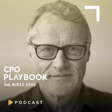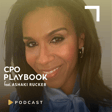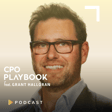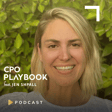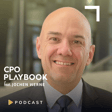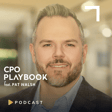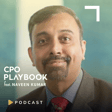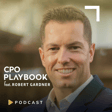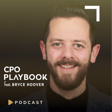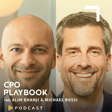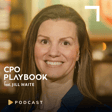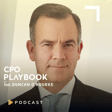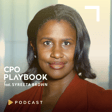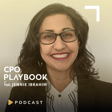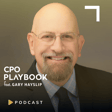Introduction to the CPO Playbook and Business Challenges
00:00:01
Speaker
I'm Felicia Shakiba, and this is CPO Playbook, where we solve a business challenge in every episode.
Founders' Journey and CEO Longevity
00:00:14
Speaker
Founding partner at Underscore a VC claims that only 50% of founders remain CEOs after being in business for three years, 40% after four, and a sadly low 25% of founders actually make it through their company's IPO as CEO.
Talent Attraction and Retention for Startups
00:00:33
Speaker
One of the greatest need from an entrepreneur is to attract and retain talent. where founding team members and early hires become critical to the success of a startup.
Meet Anil Joshi: Venture Capital Insights
00:00:45
Speaker
Anil Joshi is the founder and managing partner at Unicorn India Ventures, a leading venture capital fund to focused on early stage investments in tech companies. Anil has been at the helm of over 100 venture financing deals.
00:01:03
Speaker
He serves on the board of several companies in the field of FinTech, Robotic, Meditech, and more. He is here to share his perspective on what it takes to start and sustain a successful startup as a founder. Bye, Neil. Thank you so much for being here with us. Thank you. Pleasure is mine.
Key Skills for Early-Stage Founders
00:01:26
Speaker
When you're evaluating early stage founders, what are the key skills and qualities that you look for that you think will enable them to build a truly scalable business? So we are early stage investor. We get into seed stage as a first institutional investor. And in most cases, these are first generation entrepreneurs without any background.
00:01:54
Speaker
In some cases these are just straight out of college, so not much to evaluate. So we have to rely more on entrepreneurial quality. So we look at team compatibility of the team, how founders compatible each other. We generally avoid founders who carry same skill sets because then it's difficult to navigate business for different aspects of the business because business is just not product development, it also involves building team, it also involves
00:02:26
Speaker
sales, it involves scaling up, expansion.
Evaluating Founders: Vision and Uniqueness
00:02:30
Speaker
So for us, the quality of founders is very important. And the only thing which we can evaluate at the early stage is founder's background, what they have done in past, what kind of qualification they have, what kind of projects they have handled, and if they have worked, what kind of experience they have. This is one very important aspect for us while evaluating any opportunity which we look at for investment. Apart from that, we also try to look at the clarity of thoughts. What problem founders are solving? Is it just local problem or it's a universal problem? Then solution what they have built? Is it unique? Does they have any IP?
00:03:14
Speaker
because if they have IP, then certainly it provides good mode for business, allow founders to build business without much competition.
Leadership Qualities and Exit Strategies
00:03:24
Speaker
So IP is very important, which we play a lot of emphasis. Apart from that, we also look at the execution capability of founding team. In most cases, the founding team is able to get started, have one, two, three customers. But when it comes to scaling, when it comes to building team, then I think that's the time when most of the founders find it difficult. So we look at the execution capabilities. We also look at the leadership quality of the founders. In many cases, we would have ventures which has two, three, four co-founders.
00:04:01
Speaker
Now it's very important to identify who has CEO or leadership quality because in any organization, that can be only one leader. There cannot be multiple leaders because that results in the chaotic situation. So we definitely look for who is the CEO, who is the one who can take the shot, who is the one who can lead the team and last not the least we also evaluate whether the opportunity which we are going to invest would provide us exit or not because if we are stuck with investment then though it might do good but maybe a bad investment because we are unable to take exit
00:04:39
Speaker
So these are the few or the qualities which we look at apart from many more but these are very important qualities for our evaluation for any opportunity we look at. So I heard IP is important, the team's capabilities, and most of them might be coming out of grad school. So there's not much to go on, but can they basically execute what that you need them to execute?
Identifying the CEO Among Co-founders
00:05:05
Speaker
I also heard leadership, which I'm actually very curious about because you said sometimes founders come together as a team, but it's really about, can we identify who is the CEO? And I feel like that can get a little bit muddy.
00:05:21
Speaker
in the sense that maybe they don't know who is going to be CEO. Maybe they both or all three, who however many there are, all want to be CEO. How do you get to identifying the CEO of this startup? So it's not easy formula. It takes time being this space for the last 20 years, both me and my co-founder. And I think certain qualities you pick up with experience. But I'll share one very interesting example. This is from our second fund where we invested in a company, two co-founders.
00:06:00
Speaker
serial entrepreneurs. This was their third venture. Of course, the first two ventures didn't did well, but this was their third venture. And they come from a reasonably premium institute from India. So they were ticking box for our investment. And while investing, we did check who would like to read. And they were very clear that one of the co-founders would receive. And the business they were building in was enabling solo entrepreneurs go online. In many cases you have seen that there are boutique ventures which are very local, very hyper-local and their market restriction becomes very small because they are very hyper-local. So they thought why not provide a platform where hyper-local entrepreneurs can go global and that's how they started. The business got very good traction but unfortunately
00:06:52
Speaker
they were unable to track the revenue model. So while business was growing, but there was no revenue, almost negligible revenue. And business was just scaling and sucking the expenses for sustaining that business. And then they decided to pivot and they used almost 789 month to come out with the second product, which was more B2B. Now, if you look at the first business was more kind of B2B2C, but the second business which they built on was more B2B, helping SaaS company, helping web applications, mobile applications company to have
00:07:33
Speaker
one-click navigation and here we were pleasantly surprised because the founder switched roles. The second founder who was not a CEO now became a CEO and CEO chose to be under his leadership. So I think these are the qualities which actually helps building great organization. We were very clear when we invested in because in most cases and I will also share one more very interesting example without naming the venture. We invested again, this is again example from our second fund where we invested in two co-founders come from premium institutes from India and everything was ticking blocks for us to invest in. They also had their post-graduation from premium institute. One left doctorate from one of the known university from US, came back to India, started this business.
00:08:22
Speaker
And we actually identified the leadership traits in the CEO. And we highlighted a couple of times to the CEO that he needed to step down and allow the second person to lead because he was showing all leadership quality for the business they were building in. And in doing so, we lost almost 15 months. And ultimately, when we, as a board member, exercised our right, unfortunately, the CEO stepped down and left the company. Now the company which has two co-founders is now left with only one founder. So these are the pitfalls. If we are not able to make good decision at the time of investment, we carry this one risk in all investment where founders stepping down and say they don't want to build it. As I said, these are early stage companies where everything is dependent on founding team. It's not that it's a stable business where you can bring in professionals, you pay them,
00:09:18
Speaker
market salaries and they take over the business, no, that's not the case. So it's very important to identify these qualities. And honestly speaking, this only can come through experience. There's no magic sauce or there's no formula which you can apply. You cannot have a questionnaire. So I think it takes time. We are still learning to be honest with you. I would imagine that as leaders and founders grow, perhaps one founder might be a good fit as CEO in the beginning. And then perhaps that situation might change where a different founder might be good for moving forward after six to 12 months. So I could imagine the continuous calibration you might need to have in order to really understand
00:10:07
Speaker
who is the right fit for the right stage of the business. So I'm also curious to hear more about how you assess a founder's ability to attract and retain top talent as their company grows on the same thread. What are some of the things that you look for there? When we evaluate or when we interact with founders, we try
Assessing Leadership and Talent Retention
00:10:30
Speaker
to evaluate whether they are able to sell their vision to us or not in very first place. because if they are not able to convince us, it will be very difficult for them to build a team. One more important aspect, what I would like to add here, as I said that you may be good in getting started, but there may be challenges when you have to scale up. Our founders or the founding team
00:10:57
Speaker
willing to accept an external CEO or not. A very interesting case I would like to share, and I'll get back to your question about identifying those traits. We invested in a three co-founder company, first fund which we started in 2016. And the team was like exceptional in execution. So if you give them tasks, they will give result. But when it went to next stage, none of them were capable. And it took almost a six months to make them understand that there's a need for external CEO. There's a need for professionals who can not only scale up the venture, but also help navigate them in their vision.
00:11:40
Speaker
And finally they agreed. It took us almost five, six months. Finally they agreed. So we got some expat who was working in Singapore. And he came in. Not only he helped raise more money for the company, but he also helped scale up the business. He was also instrumental. Of course, the founding team was equally ah contributing in all aspects of business. He not only helped scale, but he also helped us get the exit. So I think it's very important to understand the software aspects where people are willing to accept somebody else coming and leading them, whether they have clear leadership quality or not. So these are very soft aspect. So as a policy, we try to spend two, three months with the founder founding team, try to understand their
00:12:33
Speaker
qualities, how do they handle people, how do they behave with the team, what kind of leadership quality they show. We also try to go out dinner with the family, what's their behavior when we are having dinner, try to spend as much. time as much possible so that we are able to pick up if there are any signals. So I don't believe that every person is perfect. So there won't be some gray areas which we may need to work on. So the objective is to just identify which are the gray areas which we we need to work post investment.
00:13:07
Speaker
and that also allows us reasonable amount of time while founders are building venture because the amount we normally invest is for 15 to 18 months and that is the only time period available to us for make corrections if required. and also founders to come to a stage either the business is self-sustainable or they're able to raise more money. So we try to identify all three areas or weaker points which we need to work on and I think with experience we have gained some insights doing that.
00:13:42
Speaker
You're really looking at the entire person and not just them as founders, but as family members, as someone who you go to dinner with, as who they are with people outside of their business and really try and find those themes. And it sounds like you are forgiving because like you said, not everyone's perfect, which I really ah do appreciate you saying. And so on that thread, in your experience, what are the common gaps or weaknesses that you tend to see in founders' skill sets? And how do you work with them to help address those gaps?
00:14:22
Speaker
like approach is very lonely journeyy That's the reason we prefer having at least two founders or three co-founders. And the journey is very stressful. In many cases, founders may not be comfortable sharing stressful situations with their family because they don't want to give stress to their family members. And hence it is very important that we become a sounding board for them so that they can vent out because all our investments are dependent on founding team. I have seen a very interesting case where we could have found buyer for the business, but the founding team gave up. They didn't have the strength to continue for hundred three months in difficult time because if you're running out of resources, you don't have money to pay rent, you don't have money to pay a salary, you don't have money to pay like electricity bill.
00:15:17
Speaker
And if you're talking about 90 days or three months, which is a good 90 day, every day is a very tough day for a founder. So we try to see how strong founders are, what kind of help they may need. In many cases, we even have helped and have gone out of way to provide some extra funding so that once stress is taken out, they can focus more on business. In many cases, we have seen founders are unable to attract good talent. This also becomes a point which is very important for growth of the business and we have to chip in to to help get person on board, give them that confidence that why this venture, why this founding team and why they are important for the business. So we try to identify areas. So if you recollect, I spoke about one of the portfolio company from Fund One, the three co-founders, very good in execution.
00:16:10
Speaker
but realized that it would be difficult for them to accept external CEO and we then started mentoring them. We started making them understand why it is important and if they don't do it, they won't reach to a dead end and then business will go nowhere.
Dedication of Founders: Case Study
00:16:28
Speaker
Because we started early, team get realized after a few months. And then to my surprise, they themselves came to us and said, yes, we need to have an external CEO. Can you help us? So we try to identify release here the points, which we need to work on.
00:16:45
Speaker
In many cases, you see that almost 99% cases with founders are very technical. They come from a technical background and they're good in numbers. When it comes to finance, when you have to understand cash flow, when you have to understand it the revenue cycles, it becomes difficult for people to sometimes manage business from that perspective. So we try to help them seek necessary help. In many cases, we have extended our CFO to help them navigate tougher times. So the initial interaction when we are evaluating business, we try to understand what are the weaker areas which we need to work on because the business
00:17:24
Speaker
solution what they're working on their sword. They are the best team who are doing it and that's the reason we invest in them. But we also try to identify the areas where they would need some help. We try to know work on them while we have invested in those companies. So when you think about those soft skills that they might need to be successful in the stage of company that they're at, what would be the top two or three soft skills? I think one is leadership because when they start, they are maybe two, three, four, five, six, seven. It's easy to manage that kind of team, but if you have to build team, which probably is 200, 300, then you definitely need to have leadership quality. So that's one aspect, their ability to delegate, their ability to replicate themselves. That's one.
00:18:14
Speaker
The second quality which is very important for any organization is to build team. Are they able to attract leaders for their own verticals? Are they able to train them? Are they able to delegate the responsibilities and see how business can you know be scaled up? I think these are the two qualities which we matter for all businesses, ability to lead from front and also to build team. I have a very interesting example. One of my very old investments, which I did it even before I started this fund, when I was heading by Angels, which is a leading angel group in India. And here, founder was actually very high profile. CXO had very fancy vehicles, very good house. When you're building a business, it's not easy. Every day is not good.
00:19:03
Speaker
and time came in where he had to sell his house, he has to sell his cars so that he could manage, run his business, he could pay employee salary. I even remember he didn't have money to pay the rent for bigger office, so worked out of smaller office and he was a bond leader. He was able to motivate team which actually worked for a couple of months out of staircase. I don't think any founder would be able to motivate the team to that extent where people work out of staircase, they are not paid and then still they are building world class product. So these are some special qualities which every founder need to have it because journey is not simple, journey knee is not same. You will have tough time and you need to keep your team intact. If team is there, you can build business.
00:19:57
Speaker
I'd have to agree with you. I think when you have a great team and you have a poor product, a great team can always help fix the product, right? But a great product can't always fix a poor performing team. So I hear you on on that. Can you share a specific example of a founder who you've worked with who was really able to successfully scale their business? And what do you think were the key factors that enabled their success?
Success Story: Gin Robotic Investment
00:20:30
Speaker
So I'll share one very interesting case study. This is from our Fund One. It's a company called Gin Robotic. And there are four co-founders who started this business. And we invested in this company when it was almost at a prototype stage. And to give you a background, I was literally forced to meet this team, which I was not keen after hearing some background, but they said, will not regret. And I respected gentleman's judgment. And I went, I said, I'm only going for 10 minutes.
00:21:02
Speaker
And they took me to one small office, which was in basement. Office was something size of 8x8, very small, even hardly 8 people can stand. And when I entered the room, there were 6 boys standing and there was the one model which was dangling from the roof. I said what is this and then the founder started and if you can imagine that the prototype which was hanging from wall was mix of plywood cardboard chains and I had no idea what it was and then founders started ah with all their passion right you asked me how do you make a decision whether team is capable or not and
00:21:44
Speaker
Passion what is boys hardly an year experience straight out of college. They are provided a very small less than 10,000 grand from the state government and they worked on this prototype. And the founder started with his pitch. He knew that I'm there only for 10 minutes. And they were basically building a robot which was eliminating human intervention for teening manhole. And world over, it's banned to have human intervention for teening manhole because one, it's very toxic. Many people have lost their life.
00:22:21
Speaker
And that actually caught my attention. I said, what they're doing? Because if your manual is clogged, the only way to unclog is to have human intervention. And they said, we are trying to build something, a robot which will function like a human and will eliminate human intervention for clogging. And they said, they're building something which will eliminate human intervention. And I said, where are you in terms of your business? They said, this is what it is you're seeing in front of your eyes, something hanging from the wall. and I said this business is certainly not fundable because it's still at a prototype stage but I said the least right I can do for this team is to invest an amount which help them converting this prototype to actual product and wrote a very small check I think it was less than a hundred thousand dollars team of four founders and two interns and then we agreed to inverse this small check and
00:23:12
Speaker
listening the story, couple of very known prominent angels from India also joined us. They said, Anil, if you're doing it, we'll also join you in this. And they also wrote a very small check, sub 10,000 type, because they were not willing to take anything more and nothing less. So we invested less than $100,000 and fast forward almost six years. You will be happy to know that they have one of the best R&D set up with a team of around 65 people. The total team strength is close to 450.
00:23:43
Speaker
They had been profitable since they went in production. Not a single year they haven't shown any loss. They've been continuously growing. I don't think they had to reach out to investors. Investors actually came in and kept investing. The last round, which is almost $10 million, dollars they haven't pitched anyone. They haven't engaged the investment bankers. I think what mattered in this one investment was a passion and their ability to demonstrate technically to solve a problem using technology. They have not really deployed their solution in India, but they have also done in several other countries. Since it's a robotic company, they kept on building solutions
00:24:25
Speaker
wherever human had difficulty in solving it. So recently they have built robot which is helping issue rehabilitate, having mobility issue. People fracture the leg, they go into accident and it takes time to rehabilitate. They find it difficult to walk. and using AI, using machine learning, using Robotic, using computer vision. They have built a robot which helps in speed up the rehabilitation process for people having mobility issues. So very exceptional company. I think this company will go IPO in three years time.
00:25:03
Speaker
max four years time. So it's a very unique case where we invested when there was no team, there was no product. And in six years time, they have grown from a team of six people or four people to 400 people, exceptional entrepreneurial quality, exceptional leadership quality, exceptional delegation example, very exceptional team. Wow, that's an amazing story. I think it's a fantastic problem to solve. I'm sure everyone would agree, but it sounds like the passion came through, the ability to execute and then problem solve, or maybe like in the top three of everything that you've shared so far. Leadership certainly is the most important capability in order to scale, right? The leadership qualities of building a team and delegating. Did I miss anything?
00:25:57
Speaker
exceptional team. ah I don't know the energy they bring on table. It's a very difficult product. I said normally VC will not invest in. The business segment they're catering is not easy to do a business. And they have never even had any mandate also. I think it's a complete package. So leadership, human relationship, futuristic vision, team of this size, not seen any startup having a team of 60 people in R&D, right? So it's a true example of global company making. Exactly. Yes. And I think I've noticed that. I feel like R and&D, having that extensive portion of the business in R and&D, I think is really important. Yeah. I've been seeing that lately, actually. How do you advise founders to find that right balance between leveraging their deep technical expertise and also developing critical business and leadership skills?
00:26:51
Speaker
Oh, very interesting. I have a several examples where I know one case where we had invested almost a million dollars and maybe close to two million dollars and the founder had very close to 200 products. but not a single product was commercialized and the entire investment went down the cube. So I always tell founders that don't go away from your focus. If you have thought of building something, stay focused on that and see if it is making commercial sense or not. because business has been started to do a business and not to do charity or not to just build product for your wishful thought. The business has to make business sense. And if product is not getting translated into revenue, then there is something wrong with it. Either customer or consumer not liking it or they don't want it. I always suggest founders
00:27:50
Speaker
Build something which people need, build something which people are willing to pay for and don't do something which you want to do and the consumer don't want. stay focused, keep correcting things every three, four weeks so that you don't run out of resources because I've seen companies dying, not because as you rightly said, a good product cannot navigate to a team. So if you keep doing post correction at regular interval, stay focused. I think you'll not go wrong. And that's what I think stands true for this company, Genroportic, because I spoke about what I saw when we invested in
00:28:29
Speaker
a prototype hanging from wall. But if you look at today, it may be version six or version seven, which they work. So they continuously keep innovating what consumer are asking for. And that's the reason they have a team of 60 people in R and&D. It's not because R&D is most expensive department. It's a cost. But this cost translates into revenue if it is solving and consumer problem. So one piece of advice to any entrepreneur anywhere in the world, stay focused. Keep doing course correction. If your product is not translating into revenue, I think it needs revision or it needs correction. Stay focused.
00:29:12
Speaker
Well, that's great advice, I would assume so. And we are wrapping our episode up here, but is there anything else that you feel is important for our listeners to know other than what you've shared so far?
Advice for Aspiring Entrepreneurs
00:29:26
Speaker
Today, if you look at anthrop entrepreneurship is not different. When I graduated, I couldn't even have thought of being an entrepreneur because resources were not available. Today, be it India or any other country, I think every single moment is focused on startup. The code ecosystem is there for everyone to get started. So if you have an idea, don't hesitate. Give a try. There are forces which will certainly help you. And if you're getting started, start with an objective to build something which solves a problem, which translates into commerce. Stay focused. If need be, delegate. If need be, bring somebody who could help expanding. Be flexible. And entrepreneurship is all about flexibility.
00:30:10
Speaker
It's not being a rigid. I've seen businesses going down. So be flexible, stay focused. Best time to get started anywhere in the world. Fantastic. Thank you so much, Anil. This has been fantastic. Thank you. That's Anil Joshi, founder and managing partner at Unicorn India Ventures. If today's episode captured your interest, please consider sharing it with a friend or visit cpoplaybook dot.com to read the episode or learn more about leadership and talent management. We greatly appreciate your rating, review and support as a subscriber. I'm Felicia Shakiba. See you next Wednesday and thanks for listening.

